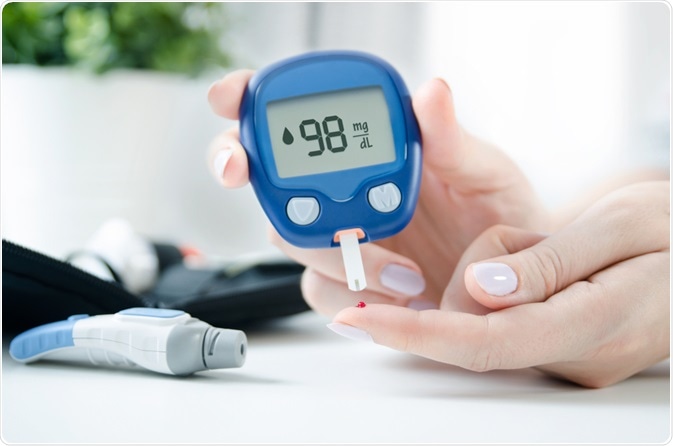Diabetes is a lifelong health condition characterized by a marked increase in blood glucose levels that can cause a plethora of health complications, including those relating to the vascular system.

Image Credit: Proxima Studio/Shutterstock.com
What is Hyperglycemia?
Hyperglycemia is the term for a marked increase in blood sugar levels which can be caused by diabetes.
There are two main types of diabetes: type 1 diabetes which is caused by an immune response that damages and destroys cells that synthesize insulin; and type 2 diabetes which develops when the cells no longer respond to insulin or in instances where the body fails to produce enough insulin.
Type 2 diabetes is more commonly diagnosed and represents approximately 90% of diabetes diagnoses in UK adults. Globally, it is thought that approximately 415 million people were affected by the condition in 2015.
Due to the increased glucose levels, hyperglycemia can cause a range of health complications such as stroke and increased susceptibility to infections.
Researchers from the University of California have investigated the link between the condition and vascular disease, one of the more major complications, in the hope of formulating new treatments that go beyond controlling and monitoring blood glucose levels.
The team established a cellular connection between diabetes and the narrowing of blood vessels that typically increase the risk of vascular disease.
The Effects of Protein Kinase A on Blood Vessel Constriction
The team had previously conducted similar research using a mouse model to investigate how hypoglycemia affects the heart. They found that increased body glucose levels trigger protein kinase A, an enzyme referred to as PKA, which subsequently increases calcium channel activity which results in the constriction of blood vessels.
This finding was in contrast to previous studies that demonstrate PKA association with the widening of blood vessels. As a result of their findings, the researchers began to investigate the molecular mechanisms that caused this to occur.
The mechanisms underpinning how glucose activates PKA is relatively unknown. However, the team found that increased blood glucose levels activate the production of cyclic adenosine monophosphate (cAMP) in the heart’s arterial myocytes.
This mechanism was observed to be dependent on adenylyl cyclase 5 (AC5) – an enzyme involved in the production of cAMP.
To test this further, the researchers ran several experiments investigating the effects of raised blood glucose on the cerebral blood vessels and arterial cells in mice with diabetes and genetically modified mice.
Specifically, the research aimed to establish the relationship between PKA and AC5. The researchers found that AC5 assisted with the activation of cAMP and PKA, which subsequently increased the activity of calcium channels and vasoconstriction. Furthermore, the team concluded that AC5 was vital for this mechanism occurring in those with diabetes.
Vascular Complications of Diabetes
It is thought that vascular complications in those with diabetes or hyperglycemia are one of the major causes of stroke, coronary heart disease, and high blood pressure.
However, the researchers behind this study plan to conduct further experiments in the future to increase our understanding of the AC5 chain reaction in humans.
Implications of the Research
This study could assist in the development of new treatments for those with diabetes and could also address some of the health complications that people with this condition experience.
This could be a real step forward and contrast to typical treatment options that center around monitoring and controlling blood sugar levels. However, similar research suggests that hyperglycemia may cause long-lasting effects on the cardiovascular system that may persist once blood glucose levels have been controlled for.
In light of this, complementary research aiming to develop treatments for diabetes may have to take this into account.
Sources
- NHS. (2019). Diabetes. https://www.nhs.uk/conditions/diabetes/
- Papatheodorou, K., Banach, M., Bekiari, E., Rizzo, M., & Edmonds, M. (2018). Complications of Diabetes 2017. Journal of Diabetes Research. DOI: 10.1155/2018/3086167
- Syed, A. U., Reddy, G. R., Ghosh, D., Prada, M., Nystoriak, M, A., Stefano, M., Grandi, E., et al. (2019). Adenylyl cyclase 5–generated cAMP controls cerebral vascular reactivity during diabetic hyperglycemia. The Journal of Clinical Investigation. DOI: 10.1172/JCI124705
- Costantino, S., Paneni, F., & Cosentino, F. (2015). Hyperglycemia: a bad signature on the vascular system. Cardiovascular Diagnosis & Therapy. DOI: 10.3978/j.issn.2223-3652.2015.05.02
Further Reading
Last Updated: Mar 12, 2020